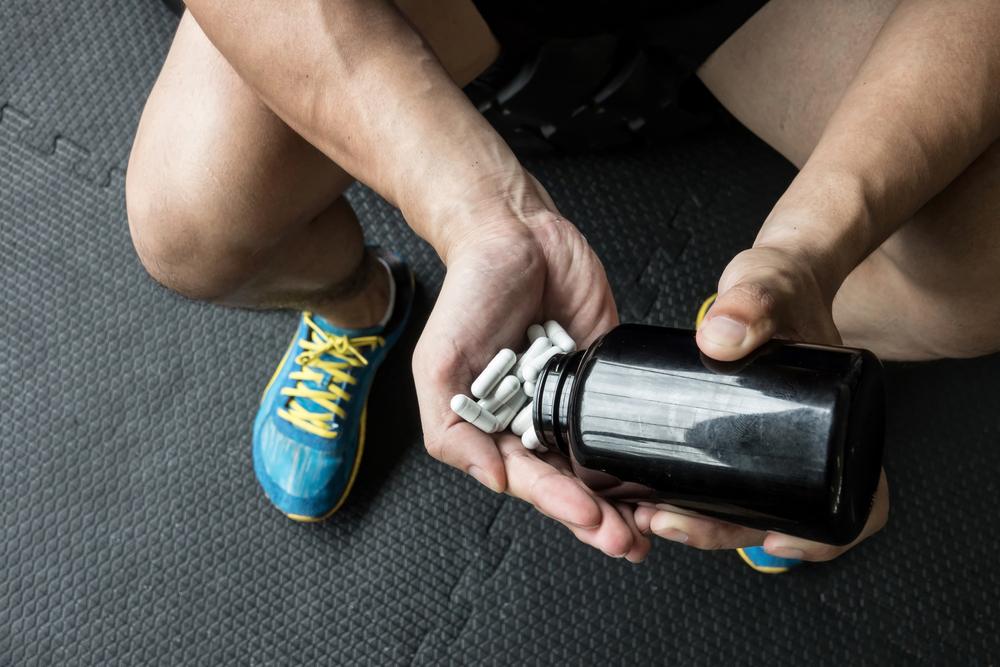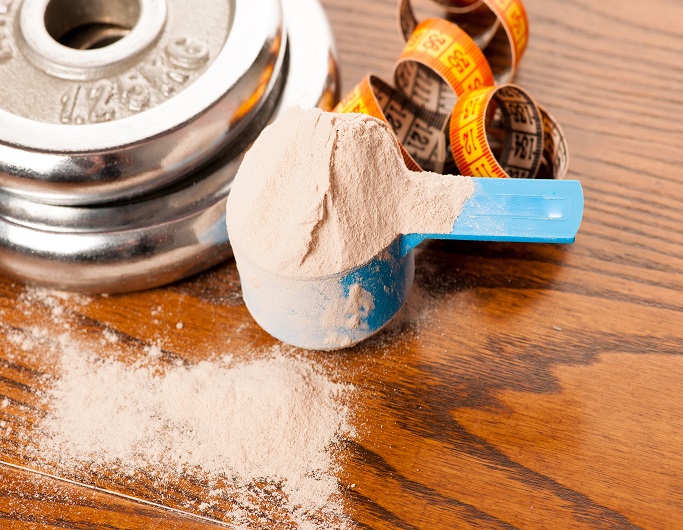
What Are Amino Acids?
Amino acids are involved in thousands of physiological processes within the human body ranging from increasing muscle mass, energy production, fat loss and even mood and motivation. So if you want to improve the results you get from training you need a basic understanding of how certain ones operate. Fortunately for you we’ve outlined the fundamentals of amino acids below and also listed some of their individual benefits.
Firstly it’s probably important to identify exactly what an amino acid is. Well put simply it’s a small molecule that links together in a long chain to form protein. They are needed by all living cells in the body and if you don’t have enough of them in your diet you could have serious health problems, never mind affecting your training.
Now there are 20 amino acids all together that can be divided into 2 groups; non-essential amino acids and essential amino acids. The 12 non-essential amino acids are called ‘non- essential’ since the body is able to make these itself from other amino acids but the 9 amino acids called essential amino are called ‘essential’ because they can’t be created in the body and have to be obtained through the foods in your diet. As well as these basic amino acids there are also performance enhancing amino compounds that have been created by sports scientists based on their ability to help enhance recovery, reduce fatigue or increase muscle mass. These are addressed later in the article since whilst it’s good to gain a basic understanding of how aminos work first, the latter are of particular importance to athletes and those who train.
Essential Amino Acids
As stated before, essential amino acids are called ‘essential’ because they can’t be created in the body and have to be obtained through the foods in your diet. These are particularly important for athletes and people who train since they can become depleted in the body during periods of intense training, stress or competition.
Leucine
Leucine is possibly the most important amino acid for building muscle and this is why so many strength athletes and bodybuilders include it in their post workout shake. This is because studies show it can stimulate skeletal muscle protein synthesis and therefore the repairing and rebuilding of muscle by activating a major complex in the anabolic pathway called the mammalian target of rapamycin (mTOR). Put more simply the mTOR is like a switch that tells our muscles to repair and regrow and if leucine is high within the body it triggers this switch, if it’s low it turns that same switch off. Leucine is available as an amimo on it’s own (£8.99 for 250g) or is 1 of 3 amimos that form what’s known as Branch Chain Amino Acids, or BCAA’s for short (£13.99 for 250g).
Isoleucine
Needed to stabilise and regulate energy and blood sugar levels, isoleucine is essential for haemoglobin formation but has also been shown in numerous studies to help prevent muscle and tissue breakdown overnight and more importantly during very strenuous forms of exercise such as iron man competitions, marathons or other extreme endurance events. Deficiencies in isoleucine can result in confusion, dizziness and irritability. Isoleucine is again 1 of 3 amimos that form the collective known as Branch Chain Amino Acids, or BCAA’s for short (£13.99 for 250g).
Valine
Valine is needed by the body to help maintain a positive nitrogen balance which is essential for promoting muscle growth. It also helps with tissue repair and muscle metabolism which is why it’s considered perfect for recovery from strenuous exercise. Another benefit of valine is that it helps to stimulate the central nervous system, helping the functioning of the brain. Valine is the last amino that forms Branch Chain Amino Acids, BCAA’s (£13.99 for 250g).
Lysine
Originally used as an effective treatment for cold sores and herpes, Lysine has since been shown to play a major role in calcium absorption; building muscle protein; recovering from surgery or sports injuries; and the body’s production of hormones, enzymes and antibodies. But perhaps of more interest to bodybuilders at the Electrochemicals Department in America Harold L. Rice et al (1970) found Lysine supplementation enhanced the nitrogen balance in young men, one reason it’s now being heralded as a mass building amino.
Methionine
Particularly important to strength athletes and those who perform short bursts of exercise methionine has been shown to enhance the production of creatine and therefore favourably enhance the body’s phospagen system and reproduction of ATP (adenosine triphosphate, the molecule needed for all muscle contractions). Put simply methionine plus creatine could dramatically improve your bench, squat and deadlift.
L-Phenylalanine
L-Phenylalanine is one of two chemical forms of Phenylalanine, the other being D-Phenylalanine. Once in the body, these amino acids are transformed into another amino acid, tyrosine. Tyrosine is then converted into key neurotransmitters, dopamine, norepinephrine, and epinephrine. These are chemicals that transmit signals between nerve cells, particularly dopamine is needed for cognitive functioning and motivation, norepinephrine which increases alertness, increases attention span, minimizes the sensation of pain and also suppresses appetite. It also is required for the release of Human Growth Hormone (hGH) and stimulates the release of Luteinizing Hormone Releasing Hormone(LHRH) from the Hypothalamus. Lastly of course Epinephrine is more commonly known as adrenaline which is essential to preparing the body for exercise as it opens up the airways, raises blood pressure and quickens the heart rate.
Tryptophan
Needed for mental health tryptophan converts to 5 HTP (5-hydroxytryptophan) which plays a role in the production of serotonin, a chemical in the brain that governs mood and weight control.
Threonine
Needed to support a healthy immune system threonine has been shown to help with the creating of antibodies so is considered essential for those who may experience an ‘immune crash’ after strenuous or heavy training. It’s also used to form the body’s two most important binding substances, collagen and elastin. Lastly it’s also been found to help the absorption of other nutrients which is why protein sources containing threonine are more bio-available than others.
Alanine and Histidine
Usually put together the essential amino acid histidine and the non-essential alanine join together in the body to make a compound called carnosine, which in a study published in the Journal of Japanese physiology it stated “It has been shown that people whose muscle carnosine was high could exhibit high power during the latter half of the 30 second maximal cycle ergometer sprinting. These results suggested that the muscle carnosine concentration could be one of the important factors determining high-intensity exercise performance.” (Y Suzuki et al 2002.) Researchers later concluded their performance enhancing properties were because they had the ability to buffer lactic acid and therefore the onset of fatigue. Pure Beta Alanine is available for £10.99 for 250g from TPW™.
Non-Essential Amino Acids
Non-essential amino acids are those that the body can make itself from other aminos. Whilst they are called non-essential they have a whole range of benefits particularly for athletes which is why they are so widely recommended by sports experts.
Aspartic Acid
D Aspartic acid is actually one of very few supplements that’s actually been shown to naturally increase testosterone levels. At the Universita di Napoli Parthenope e Fondazione in Italy it was found that subjects consuming D-aspartic acid supplementation for 20 days experienced improvements in testosterone levels compared to those with a placebo, concluding ‘here we demonstrated that D-aspartic acid, which occurs as a physiological compound in the mammalian pituitary and testis, has a role in the regulation of the release and synthesis of LH and testosterone.’ (Enza Topo et al 2009.) In another study, researchers provided a group of males (aged 27-37) a daily dose of 3.12 grams of D Aspartic acid for twelve consecutive days. Testosterone levels in the subjects that received the supplement had risen by 33% after the twelve days. From an athletic perspective this allows your body to produce the compounds that help increase lean growth, strength, power and energy. Pure D Aspartic Acid is available from TPW™ £12.99 for 250g.
Glutamine and Glutamic Acid
A non-essential amino acid that’s present within the body in large amounts, glutamine has been shown to pass through the blood-brain barrier which is why it’s called a brain-food. In the brain it converts to glutamic acid, which is essential for brain functioning and increase GABA (gamma-amino-butyric-acid, another popular supplemented amino) needed or mental activities.
During periods of intense training your body’s immune system is detrimentally affected however research at the Conway Institute for Biomolecular and Biomedical Research at the University College of Dublin found that the amino acid Glutamine’s repairing qualities were so impressive it’s used to treat patients with inflammatory conditions such as infection and injury. Furthermore it’s been noted within a week of glutamine supplementation your muscles become visibly larger since you have an increase in the amount of water driven into the muscle cells similar to the effects that creatine give. This effect is known as “cell volumization.” Pure Glutamine Powder is available from TPW™ £7.79 for 250g.
Arginine
Very common in pre workout formulas, arginine is a chemical precursor to nitric oxide (a blood vessel-widening agent called a vasodilator) which basically means it’s responsible for producing that ‘pumped’ feeling you get in the gym and also helps to increase blood flow and nutrients to the muscles. Arginine Alpha-Ketoglutarate (AAKG) which is a more efficiently absorbing compound of the amino L Arginine is available from TPW™ £18.99 for 250g.
Cysteine and Cystine
Cysteine is needed to help detoxify the body and is used in producing antioxidants and protecting the brain and liver from overconsumption of alcohol and other such substances. Also again it helps to support the immune system which can become compromised when over training.
Tyrosine
Previously used to reduce stress, depression and anxiety, tyrosine is now used by athletes to increase energy and increase thyroid hormones in the body. Thyroid hormones have been shown to increase the body’s metabolism which in turn helps fat loss and many nutritionists consider this a safer and healthier way to lose weight compared to using certain thermogenics. 100% pure Tyrosine Powder is available from TPW™ £11.49 for 250g.
Glycine
Used to help healing after a heavy training routine, studies have also shown that glycine promotes growth compound release and helps the volumisation of cells. Also interestingly for athletes, glycine has also been shown to reduce Adenosine Triphosphate depletion meaning you’re able to maintain you’re maximum output for longer whether that’s a flat out sprint or 5 rep max on bench. Glycine Powder is available from TPW™ £8.49 for 250g.
Proline
Needed to help form cartilage and collagen, proline also helps muscle and joints maintain their flexibility. Also more specifically regarding muscle mass both lysine and proline are needed for protein synthesis and both needed to make hydroxyproline and hydroxylysine, two amino acids that form collagen. Collagen obviously helps to mend broken cartilage and can also serve to cushion joints during heavy lifting. This is often why strongmen competitors and power lifters supplement their diets with extra proline.
Serine
Serine actually works with creatine to then enhance Adenosine Triphosphate stores within the body. This then in turn improves muscles contractions and our maximum output whether in the gym or competition. It’s also a component of the antibodies and immunoglobulins that fight infections, and it is a component of choline, ethanolamine, sarcosine, and phospholipids involved in the transmission of signals through the nervous system. Lastly it’s also considered to be the grandparent of the oxygen transport molecule hemoglobin, the compound that makes blood red and that enables it to oxygenate the whole body. Hemoglobin is made from amino-levulinic acid, which is made from glycine, which is made from serine.
Performance Enhancing Amino Compounds
Known as performance enhancing amino compounds, these have been created due to their ability to help enhance recovery, reduce fatigue or increase muscle mass and are widely used in sports nutrition almost every type of athlete.
Branch Chain Amino Acids
Made from Leucine, Isoleucine and Valine, BCAA’s are renowned for their muscle building qualities, along with their ability to prevent muscle loss when taken preworkout. This is because during periods of intense training the body can enter into a state where the muscles begin to breakdown. But because iBCAA’s are absorbed directly into the muscle tissue and are metabolised quickly, taking them preworkout or intraworkout can help to prevent this muscle breakdown and ensure your muscles remain in a more positive state during training. Studies also show Instantised Branch Chain Amino Acids (iBCAA) have impressive muscle building properties when taken post workout as well. Specifically TPW™ iBCAA’s have been made in the optimal 2:1:1 ratio (leucine: isoleucine: valine), this is especially important post workout since research shows leucine can increase protein synthesis by as much as 33%. Protein synthesis is the process by which the muscles use protein to repair and regrow and so iBCAA supplementation post workout is particularly recommended to strength athletes or those wanting to build quality muscle. BCCA’s are available from TPW™ either in tablet form in the product BCAA Complex (£11.49 for 90 tabs) or powdered form in the product iBCAA Powder (£13.99 for 250g) which comes in unflavoured as well as Berry Blitz and Green Apple Spike.
Acetyl L Carnitine
Acetyl L Carnitine is a natural super antioxidant that can help to facilitate fat metabolism. It has been shown to reduce fatigue and act as an appetite suppressant, as well as benefit cognitive ability, memory and overall mood and well being. Acetyl L Carnitine is a fat metabolizer. It helps to facilitate fat metabolism, increase energy production in muscles and cells. It can also aid the promotion of fat loss. Acetyl L Carnitine is not normally considered an “essential” amino acid due to the fact that the body can manufacture all it needs. However, supplementing with Acetyl L Carnitine can help improve the ability of certain tissues to produce energy. Acetyl L Carnitine is available from TPW™, is £20.99 for 250g.
Citrulline Malate
Citrulline Malate is an amino acid complex supplement shown to help delay the onset of fatigue and improve exercise intensity. It’s made from combining the amino acid citrulline and the organic salt malate. It’s also one of few supplements to be used by both strength and endurance athletes. The reason Citrulline Malate is so widely used has a lot to do with the mechanisms by which it improves sports performance. Numerous studies have found that Citrulline Malate has an ability to buffer lactic acid in the muscles when working at a high intensity. It does this by improving the efficiency of the body’s energy system, whilst at the same time helping the body cope with the toxins and waste products such as lactic acid. Experts believe the latter is because Citrulline Malate can increase levels of bicarbonates in the blood. Bicarbonates are vital to controlling blood lactate levels and so increasing the levels in the blood, which in turn buffer lactic acid build up and therefore help combat that burning, fatiguing sensation you get when training to your maximum. Citrulline Malate is available from TPW™, £22.99 for 250g.
Ornithine HCL
Ornithine HCL is a powerful amino acid compound which has been shown to possess rejuvenating properties. This is particularly important during periods of intense training since it helps the entire body recover. This is why many athletes will add this to their post workout shake to help cope with the immune crash that occurs following a hard training session. Ornithine HCL has also been shown to improve the body’s response to bacteria and viruses in addition to detoxifying the body of ammonia. Ornithine HCL is also traditionally taken before bed to promote muscle repair and recovery processes that naturally peak 90 minutes after falling asleep. This ultimately enhances sleep quality, improves the entire recovery process and helps muscles, the immune system and neurotransmitters. This overall promotion of repair and recovery in the body in general has been shown to help increase muscle mass and reduce body fat. This is another reason why Ornithine HCL features in so many athlete’s supplement routine. 250g of Ornithine HCL is available from TPW™, £29.99 for 250g.
HMB
HMB is an amino acid derived from the normal breakdown of the essential amino acid Leucine. HMB is produced by the human body from the proteins in our diet and in small amounts from some of the foods we eat. Taking HMB gives the body a kick start with muscle recovery, through reducing the amount of muscle breakdown and muscle degradation post intense training. HMB became a popular choice of supplement for bodybuilders in the early 1990’s and more recently for elite athletes. Supplementation with HMB is proven to delay the breakdown of muscle protein, lower cholesterol and strengthen the body’s immune system. 250g of HMB is available from TPW™, 250g for £10.99.







No Comments yet!